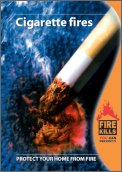
December 31, 2009 - Smokers in Florida and 11 other states will be lighting -- and relighting -- fire-safe cigarettes designed to go out when they're not puffed as the result of new laws that will take effect Friday, January 1, 2010.
The states are among the last to require that all cigarettes meet standards first implemented by New York six years ago. The states with laws going on the books this week are Alabama, Arkansas, Florida, Georgia, Michigan, Missouri, Nebraska, New Mexico, North Carolina, South Carolina, Tennessee and Virginia. (Missouri - fire-safe cigarettes delayed until January 2011..)
Wyoming is the only state that hasn't passed such a law, according to the Coalition for Fire-Safe Cigarettes. Fire-safe cigarette laws will also take effect in Mississippi, Ohio and South Dakota by the first week of 2011. On October 1, 2005, Canada became the first country to implement a nationwide cigarette fire-safety standard.
"Cigarettes are a major cause of fires, especially in residential occupancies," said Jim Goodloe, chief of fire prevention for the Florida Division of State Fire Marshal. Florida passed its law in 2008. The coalition says cigarettes cause 700 to 900 fire deaths and about 3,000 injuries every year in the United States -- many of them among nonsmokers. The coalition's members include fire prevention, consumer and health organizations. The fire-safe standards require cigarettes to burn out 75 percent of the time when not in use.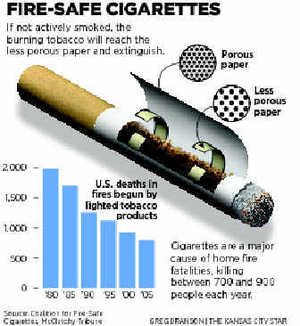 "There's tiny, ultra-thin bands of paper that are literally layered on the white part of the cigarette and when the lit end of the product crosses one of those bands it acts like a speed bump and it slows down the burn rate,"' said David Sutton, spokesman for Altria Group, parent of Philip Morris USA, the nation's largest tobacco company.
"There's tiny, ultra-thin bands of paper that are literally layered on the white part of the cigarette and when the lit end of the product crosses one of those bands it acts like a speed bump and it slows down the burn rate,"' said David Sutton, spokesman for Altria Group, parent of Philip Morris USA, the nation's largest tobacco company.
Most tobacco companies have supported the move to fire-safe cigarettes. Sutton said his company has been working with states to make sure all adopt the New York standards. The maker of Marlboro, Chesterfield, L&M and Virginia Slims plans to sell nothing but fire-safe cigarettes by February 2, 2010 regardless of state laws.
Most states allow businesses to sell conventional cigarettes past the effective dates of their laws until existing stocks are exhausted. Fire-safe packs are generally marked with "FSC," for Fire Standards Compliant.
Some smokers claim the new cigarettes cause headaches and nausea and contain dangerous chemicals. Cigarettes have already been linked to cancer. David Jaromnak, a smoker from Reading, Pa., has created an organization called Citizens Against Fire Safe Cigarettes to seek repeal of the laws. He has been gathering petition signatures through a website, but did not respond to an e-mailed request for an interview.
Sutton denied that fire-safe cigarettes contain any new materials or present an additional danger to smokers. "It's the same tobacco blend," he said. It's the same kind of paper -- it just has rings on it. It's the same filter. There's no additional adhesives or any other materials added to the product." Sutton, though, cautioned that the new cigarettes are just less of a fire hazard, and not fireproof.
Reference: Florida among states to pass fire-safe cigarette law
A new law will take effect Friday in Florida and 11 other states that requires fire-safe cigarettes to go out when not in use.., by BILL KACZOR, Associated Press, 12/31/2009.
Read more...
Bringing the World of Tobacco Control closer together..
U.S. Eleven states starting January 1, 2010 will require the use of fire-safe cigarettes..
Bulgaria - Bulgartabac stays in the economy ministry, sold by middle of 2010, starting price 100,000,000 euro..

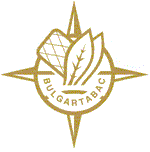 December 31, 2009 - Bulgaria's tobacco producers have asked for the transfer of Bulgartabac Holding from the economic to the agriculture ministry.
December 31, 2009 - Bulgaria's tobacco producers have asked for the transfer of Bulgartabac Holding from the economic to the agriculture ministry.
Meeting for the perspectives of tobacco producers was held Tuesday, December 22nd in the Council of Ministers. The meeting was attended by the finance minister Simeon Dyankov, economy minister Traycho Traykov, Minister of Agriculture and Foods Miroslav Daydenov, representatives of Bulgartabac Holding and tobacco producers. As a result the Bulgarian Ministry of Economy, Energy and Tourism remains principal of the tobacco holding Bulgartabac, said economy minister Traycho Traykov. The reason is the holding’s privatization. It is believed that the economy ministry will complete the task best. Bulgartabac will be privatized by the middle of 2010, says Traycho Traykov.
Traykov: The holding’s price will start from a nine-digit sum in euro. We are closer to EUR 100,000,000 (143,274,697.61 USD).
Earlier on Tuesday ministers met with Prime Minister Boyko Borisov to discuss the perspectives before tobacco production in Bulgaria. Borisov took into account all pros and cons, the minister said. I believe Bulgartabac should be privatized, because every day of delay makes the situation worse, he highlighted.
The major problem Bulgartabac faces is contraband, but the minister says the Interior Ministry and Finance Ministry will resolve it. (Bulgaria - one third of the tobacco products sold are illicit..)
Reference: Bulgartabac to be privatized by the middle of 2010 (ROUNDUP), Focus News Agency, 12/29/2009.
Bulgaria related news briefs:
Bulgaria - tobacco producers propose Bulgartabac transfer..;
Bulgaria - government, tobacco growers reach subsidy agreement..;
Bulgaria - start of steps leading to the privatization of the state-owned cigarette monopoly Bulgartabac..;
Bulgaria - police hold smoking protest over lack of bonuses..;
Bulgaria - police busts major cigarette contraband ring..;
Bulgaria - Bulgartabac Holding” will be privatized in 2010..;
Bulgaria - MPs Impose Hefty Fines on Cigarette Sales Violators..;
Bulgartabac Chief - cigarette tax increase as of January 1, 2010..;
Bulgaria Bulgartabac Holding Sells 23% of Shares to Mutual Funds..;
Bulgaria - more than 70% of smokers want to quit..;
Bulgaria - cigarette taxes going up each year except 2011..;
Bulgaria - chair of the economic committee in parliament disapproves of planned raise in excise duties on cigarettes..;
Bulgaria and others - smoking ban, increased cigarette taxes, smuggling..;
Bulgaria - Cigarette excise duties will be increased next year..;
Bulgaria - cigarette contraband, government loses BGN 920M yearly..;
Bulgaria - one third of the tobacco products sold are illicit..;
Bulgaria - new government to speed-up Bulgartabac sale..;
Bulgaria - Fake Victory Light cigarettes..;
Bulgaria's tobacco monopoly may be up for sale..;
Bulgarian lawmakers vote to ban smoking in all publc places from June 2010..; Bulgarian tobacco company Sofia-BT exports increase by 541 percent..;
Does Russia own Bulgaria's tobacco monopoly, Bulgartabac..;
EU percent of adults smokers -highest Greece 1 , Bulgaria 2.. - lowest Slovenia..;
Bulgaria - 1 in 3 youths smoke / half of pregnant women smoke..;
PMI training Bulgarian custom officers to stop cigarette smuggling..;
Philip Morris International (PMI) was truly happy they had been back in the Bulgarian cigarette market for a year and had already had 6.8% of market..;
WHO FCTC Protocol to Prevent Illicit Trade in Tobacco Products Won't Be Completed Until End of 2010..;
WHO Report on the Global Tobacco Epidemic 2008..;
Bulgaria Enters 2009 with Cigarette Prices Hike...
Bulgaria is marking Tuesday, November 10, 2009, the 20th year since the internal coup at the Bulgarian Communist Party which led to the crumbling of the communist regime..
Read more...
Altria expecting Copenhagen Wintergreen to have big impact..
Click to enlarge..
December 30, 2009 - Altria Group Inc. is expecting Copenhagen Wintergreen, which started selling in stores across the country this month, to have a big impact, as well. It's only the fifth product in Copenhagen's 187-year history.
Altria chairman and chief executive Michael Szymanczyk believes the new product could help Altria carve out another 8 percent of the growing market for smokeless tobacco -- one of the fastest-growing lines in the nation's convenience stores, with a 7.7 percent rise last year on the heels of a 6.2 percent increase the previous year.
That's not chicken feed: Based on revenues after this spring's 62-cent-a-can price cut, each percentage point of market share translates to about $25 million a year in revenue, a Richmond Times-Dispatch analysis of Altria's financial filings suggests.
"Smokeless is clearly very important to them," said Steven F. Marascia, director of research at Capitol Securities Management Inc. in Richmond.
Directly related news brief:
C-Store Update - Copenhagen Long Cut Wintergreen, another new Marlboro coming..;
C-store Update - Camel Dissolvable Sampler Packs, Skoal pouches, etc..;
Altria Group q3 2009 Earnings Call Transcript - keypoints..
U.S. Smokeless Tobacco, which Altria acquired this year for $11.7 billion, long had wanted to move Copenhagen into the wintergreen-flavored segment, the biggest part of the smokeless market. But the company felt it couldn't get the flavor quite right. It was after the acquisition, working closely with the tobacco-flavoring experts at Altria's Philip Morris USA cigarette business, that U.S. Smokeless felt it had found the right taste, Altria spokesman Bill Phelps said.
The new product, meanwhile, was the first launch of a smokeless product for the company's newly formed Altria Sales and Distribution operation. The whole idea of the unit is that the same selling system that made Philip Morris USA's Marlboro the nation's No. 1 cigarette brand would work for other kinds of tobacco, as well.
Copenhagen's 23% market share closely trails sister brand Skoal.
"Cope users are very loyal, though they will buy others' wintergreen occasionally just for a change of pace," he said. "They like [the new Copenhagen]. Other wintergreen dippers saw it and said they wanted to try it because it is Copenhagen."
Making sure that idea got through was a top marketing priority at Altria, the report said. That is why the can still is fiberboard with a metal top, instead of the plastic other firms use. The lettering on the can still is the stately serif-footed style Copenhagen has used for decades.
Every store is different—even among Price's own four. In two, the new Copenhagen Wintergreen sold out, and he had to reorder quickly. In the other two, the new variety was slower to take off. Generally, though, Price said he thinks the new brand will win new customers. "In the moist smokeless area, Copenhagen is the gold standard," he opined.
Copenhagen's 23 percent market share closely trails sister brand Skoal.
"'Cope' users are very loyal, though they will buy others' wintergreen occasionally just for a change of pace," Altria spokesman Bill Phelps said. "They like this," he added, about the new Copenhagen. "Other wintergreen dippers saw it and said they wanted to try it because it is Copenhagen." Making sure that idea got through was a top marketing priority at Altria.
Generally, though, Harold Price with four Richmond-area Cigarettes Unlimited stores, thinks the new brand will win new customers. Price: "In the moist smokeless area, Copenhagen is the gold standard."
References: Altria expects big impact from Copenhagen Wintergreen by David Ress, Richmond Times-Dispatch, 12/26/2009; Wintergreen Gold Altria, retailers expect big impact from new Copenhagen variety Convenience Store / Petroleum (CSP) Daily News, 12/28/2009.
Read more...
Tokyo, Japan - smokers find haven on smoke-free streets..
Click to enlarge; photo by: Julian Ryall..
December 30, 2009 - Increasingly unwelcome on the streets of Tokyo and in a growing number of cafes and restaurants throughout the city, smokers have a haven for their habit. The brainchild of Towa Food Service, which also operates a chain of conventional coffee shops, the first Cafe Tobacco opened in April close to JR Shimbashi Station - a hub for salarymen on their way to work or home at the end of the evening.
Related news briefs:
July 15, 2009 - Japan - tobacco control people upset with smoker-only cafes..;
July 7, 2009 - Japan - Tokyo smoking cafes, people with children, those under 20 NOT allowed...
Japan lags behind other countries in terms of legislation on tobacco. The only laws to have been passed at the national level to try to combat smoking involve making the health warnings on packets more prominent, while schools, hospitals, large stores and public facilities are meant to protect people from second-hand smoke, although there are no punishments for those that do not.
Nevertheless, the smoking rate in Japan is declining. A study released in November by the Ministry of Health, Labour and Welfare showed that the smoking rate among men has fallen to 36.8 percent - the lowest level since such surveys were started in 1986 - while the figure for women came to 9.1 percent, below the 10 percent threshold for the first time since 2001. (August 14, 2009 - Japan Tobacco, Inc, annual survey finds 24.9% adults smoke..)
Overall, the smoking rate stood at 21.8 percent, down sharply from 27.7 percent just five years ago.
Reference: Smokers find haven on Tokyo's smoke-free streets, Independent.co.uk, 12/23/2009.
Read more...
Bangladesh - nearly 70 percent of current smokers are planning to quit ..

December 29, 2009 - As over 5 million people die globally each year due to tobacco-related diseases, nearly 70 percent of the current smokers in Bangladesh are planning to quit smoking, according to a survey.
"More significantly, almost half of the current smokers (47.3 %) made attempts to give up smoking in the last 12 months," the survey says.
The survey titled Global Adult Tobacco Survey (GATS)- Bangladesh Report 2009, is the first ever assessment made in Bangladesh in private sector using electronic means of data collection. The National Institute of Preventive and Social Medicine (NIPSOM) in collaboration with Bangladesh Bureau of Statistics (BBS) and the National Institute of Population Research and Training (NIPORT) conducted the survey.
See related news brief: Bangladesh - tobacco use among adults reaches 43.3 percent..
It was conducted this year as a household survey among the people of 15 years of age and above. The data were collected from 200 urban and 200 rural primary sampling units drawn by a multi-stage, clustered sample design to produce nationality representative data. The World Health Organization (WHO) and US Centers for Disease Control (CDC) and Prevention provided technical assistance for conducting the survey with financial assistance from Bloomberg Philanthropies under the Bloomberg Global Initiative to Reduce Tobacco Use.
Bangladesh is one of those countries where both production and consumption of tobacco are high and it is overburdened with tobacco-related diseases.
Though a good number of smokers plan to change their habit realizing its dangerous effects on health, the number of smokers is not falling at all. A 2004 WHO study attributed 57,000 deaths and 382,000 disabilities in Bangladesh to tobacco use.
The current survey finds 21.9 million tobacco users in Bangladesh while 25.9 million of the adult population currently uses smokeless tobacco. Though the prevalence is almost similar in males (26.4 %) and females (27.9), the current smokeless tobacco use is more prevalent in rural areas.
In Bangladesh, tobacco is consumed both in smoking form such as cigarette, bidi and hukkhah, and smokeless form as zarda, sada pata, gul, etc.
According to data available from the survey, among all adults, 45 percent were exposed to secondhand smoke, which is known as passive smoking, in public places.
The study shows that overall, 97.4 percent of the adults believe that smoking causes serious illness. However, their beliefs differ regarding the causation of various diseases.
Data show that four in five people, including tobacco consumers, supported an increase in tobacco taxes.
Health and Family Welfare Minister Prof Dr AFM Ruhal Haque said the government has a plan to increase tax on tobacco products, especially bidi, so that the supply and consumption of these harmful stuffs can be cut down significantly. "It's essential to have effective tobacco-control programms in the country to prevent premature deaths and disabilities as 57,000 people due to smoking every year in Bangladesh," he said. He emphasized education for all which can be the best option to make smokers aware about its bad impacts on health, as the rate of smokers is higher among the uneducated people. Researchers think tobacco is more prevalent in rural areas (45.1 %) than urban areas, as people there are mostly uneducated. So, the government wants to make it costly so that people cannot afford it.
It is believed that the supply and production of tobacco cannot be stopped unless its demand is reduced.
Statement Regarding First Release of Global Adult Tobacco Survey Results by Bangladesh.., Media Newswire. Thirteen countries besides Bangladesh participated in the first round of GATS: Brazil, China, Egypt, India, Mexico, Philippines, Poland, Russian Federation, Thailand, Turkey, Ukraine, Uruguay, and Vietnam. Results from GATS will help Bangladesh and the other participating countries that will soon be releasing results. Likewise, results will help countries translate data into action through improved policies and programs.
Researchers suggest formulation of a policy to make public places and offices 100-percent free from smoking and ensure its effective implementation.
Reference: 70 pc smokers plan to give up: Awareness about bad effects on rise, United News of Bangladesh (UNB), The New Nation, 12/26/2009.
Related news brief:
Bangladesh - tobacco use among adults reaches 43.3 percent..;
Bangladesh - FCTC overtaxation hurts tobacco industry country depends on..;
Bangladeshi government will increase taxes on tobacco products..;
Marlboro to be Marketed in Bangladesh - One of the Poorest and Densely Populated Countries in the World..
Read more...
Vietnam - who will enforce smoking ban to start January 1, 2010??
 December 29, 2009 - A new government decision to ban smoking in indoor public areas will be effective from January 1, 2010, but it is still unclear who will make the ban come true. The decision says a person found smoking in public places will be fined between VND50,000 (US$2.6) and VND100,000 (US$5.2), but who will force smokers to pay fines is not mentioned.
December 29, 2009 - A new government decision to ban smoking in indoor public areas will be effective from January 1, 2010, but it is still unclear who will make the ban come true. The decision says a person found smoking in public places will be fined between VND50,000 (US$2.6) and VND100,000 (US$5.2), but who will force smokers to pay fines is not mentioned.
The Vietnam Ministry of Health and the World Lung Foundation on December 18 launched a national campaign calling for a smoking ban in all public places.
Ministry of Transport chief inspector, Nguyen Xuan Hao, said inspectors had yet to receive any instructions on how to punish smokers in public places. Hao said a lack of traffic inspectors may cause difficulties in implementing the smoking ban.
According to the Tobacco Prevention Program office, 30 ministries and agencies have submitted their plans on banning public smoking, in which the Ministry of Public Security proposed that policemen are authorized to punish violators.
Back in August 2009 it was reported that Viet Nam would ban smoking and increase taxes on tobacco products.. The ban will include classrooms, kindergartens, healthcare facilities, libraries, theaters, cinemas, public transportation and indoor workplaces.
The government will continue to ban tobacco sales to people under 18 as well as sales via the internet, telephone or automatic selling machines. Only authorized retail outlets would be allowed to sell tobacco products from 2010.
Prime Minister Nguyen Tan Dung also gave his approval to impose higher taxes on tobacco imports from 2010.
Vietnam has one of the highest smoking rates in the world but there is a marked disparity between the numbers of male to female smokers, with 56.1 percent of men lighting up regularly compared to only 1.8 percent of women. According to World Health Organization more than 40,000 Vietnamese die from smoking-related diseases each year.
Reference: Smoking ban grows dim, Tuoi Tre, Vietnewsonline.vn, 12/28/2009.
Vietnam - some related news brief:
Vietnam - national campaign launched calling for smoking ban..;
Viet Nam - to ban smoking and increase tax..;
Read more...
Hawaii - tobacco tax increases help curtail local sales of cigarettes and cigars..

December 29, 2009 - Through the first 10 months of the year, Hawai'i consumers bought 417 million packs of cigarettes, which, based on state tax collections, was down 12 percent from the same period a year ago.
Higher tobacco taxes are aimed at driving down demand while simultaneously increasing income for the state and for programs such as cancer research. So far it's been a formula that has delivered — sales of cigarettes statewide have been declining in recent years and the increased tax rates have more than offset the reduction in sales.
However, state tax hikes, coupled with federal tobacco tax increases, may be starting to jeopardize that revenues stream. "I think we have reached the cross-point," said Lowell Kalapa, president of the nonprofit watchdog Tax Foundation of Hawaii. "It's gotten to the point where people are actually quitting."
Through the first five months of the fiscal year, total cigarette tax collections are up $3.8 million over the same period a year ago. However, the state is counting on even faster growth in cigarette tax collections. The state was planning to get a boost of nearly $2 million a month in added cigarette taxes between July 2009 and June 2011. That excludes about 30 percent of collections that pay for cancer research, emergency services and other needs.
That money was projected to come from a 40 cents per pack increase in state taxes on cigarettes, to $2.60 a pack on July 1. The state tax on cigars also rose, from 40 percent to 50 percent of the product's wholesale price.
However, because of a glitch in the law neither tax hike took effect until October. During October — the first month tax increases took effect — total cigarette tax collections fell $2.4 million to $7.8 million compared with October 2008. Other tobacco-related tax collections — including taxes on cigars — fell by $236,715 to $54,053 during the same period.
$8 to $9 per pack
Declining tobacco-related sales may be partly tied to a prolonged economic slowdown. They also coincide with a series of state cigarette tax hikes that raised the tax on a pack of cigarettes by $1 since 2007. Local tobacco tax increases were augmented by a 62 cents per pack hike in federal taxes on cigarettes, to about $1 a pack.
Clearly, those increases are cutting into consumption of tobacco products, said George Massengale, director of government relations for the American Cancer Society in Honolulu. "There is a strong correlation between the increase of tobacco and cigarette taxes versus consumption," he said. Massengale added that eventually tobacco tax increases will result in lower revenue as people cut back on smoking.
"Hypothetically, raising the cigarette tax (another) $1 per pack — that might cause a decline and you might see a drop in tax revenues," he said. "That was the political question over the last few years. Obviously we haven't reached that yet."
As of November, Hawai'i had the fifth highest cigarette tax in the United States, according to the National Conference of State Legislatures. Rhode Island, Connecticut , New York and New Jersey led the list.
Hawai'i's tax hike has helped push the retail price of major brand-name cigarettes to $8 to $9 for a pack of 20 cigarettes. That hasn't caused smokers such as Kaka'ako resident Michael Zehner to quit. However, it is causing others to find cheaper sources of cigarettes, he said.
"I pretty much smoke the same," Zehner said. "I try to follow the law as it's written (but) I have heard of other people that have turned to black-market sources, that have switched to cheaper brands (and) also getting them from friends in the military" or through the mail, he said.
It's too early to say whether Hawai'i's tax hikes will fall short of generating money the state needs to pay for essential programs , said state Rep. Marcus Oshiro, D-39th (Wahiawa), chairman of the House Finance Committee.
"It's something that we need to be mindful of," he said. "Maybe we need to adjust that particular revenues stream (estimate) given that there may be a curtailment of the actual consumption of cigarettes, which is good.
"It has always been a devil's bargain because you do rely upon tobacco revenues to fund critical and essential services," Oshiro said.
Most — about 70 percent — of the tax generated from cigarette and tobacco sales goes into the state's general fund. Four cents of the tax on each cigarette goes to other sources, including 2 cents a cigarette that goes into the Hawaii Cancer Research Fund. That helps fund the Cancer Research Center of Hawaii. Through the first five months of the current fiscal year, tobacco tax collections for the Hawaii Cancer Research Fund dipped to $5.7 million, versus $6.1 million during the same period a year ago, according to the state tax department.
The tax foundation's Kalapa said the state needs to choose whether it wants to stop smoking or preserve a valuable tax revenue stream. "What is the message we're sending? Is it quit smoking, it's bad for our health, while on the other hand we say smoke some more because we need money to run the cancer research center," Kalapa said. "What are you trying to do? Are you trying to stop smoking, or are you trying to increase revenues?"
Reference: Hawaii smokers cutting back in response to higher tobacco taxes, Honoluu Advertizer, 12/28/2009.
Hawaii - related news briefs:
Hawaii State Tax on Other Tobacco Products Increases 70 Percent;
Tobacco control initiatives starting Wednesday, July 1, 2009.;
Hawaii - cigarette and other tobacoo products tax increase..;
Hawaii may ban lipstick-sized packs of Virginia Slims...
Read more...
Exposure to Tobacco Smoke in Childhood Home Associated with Early Emphysema in Adulthood..

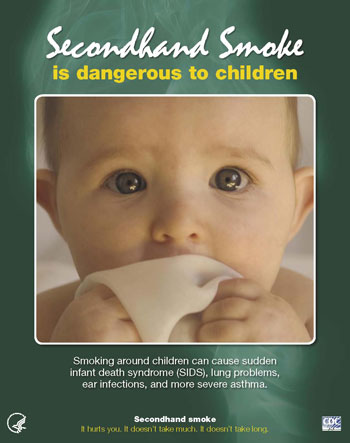 December 28, 2009 - Children regularly exposed to tobacco smoke at home were more likely to develop early emphysema in adulthood. This finding by researchers at Columbia University’s Mailman School of Public Health suggests that the lungs may not recover completely from the effects of early-life exposures to tobacco smoke (environmental tobacco smoke, ETS, passive smoking, involuntary smoking. second hand smoke, SHS, sidestream smoke).
December 28, 2009 - Children regularly exposed to tobacco smoke at home were more likely to develop early emphysema in adulthood. This finding by researchers at Columbia University’s Mailman School of Public Health suggests that the lungs may not recover completely from the effects of early-life exposures to tobacco smoke (environmental tobacco smoke, ETS, passive smoking, involuntary smoking. second hand smoke, SHS, sidestream smoke).
PAPER: Association of Environmental Tobacco Smoke Exposure in Childhood With Early Emphysema in Adulthood Among Nonsmokers The MESA-Lung Study, Gina S. Lovasi, Ana V. Diez Roux, Eric A. Hoffman, Steven M. Kawut, David R. Jacobs, Jr and R. Graham Barr, American Journal of Epidemiology 2010 171(1):54-62, ABSTRACT..
This population-based research is the first to examine the association of childhood ETS with early emphysema by CT scan in nonsmokers. Approximately half of the participants in this large multiethnic cohort had at least one regular cigarette smoker in their childhood home. Participants with more childhood ETS exposure had more emphysema-like lung pixels; an average of 20% of scan pixels were emphysema-like for those who lived with two or more smokers as a child, compared with 18% for those who lived with one regular smoker, or 17% for those who said that they did not live with a regular inside smoker as a
To read more - Mailman School of Public Health press release..
Read more...
United States - poverty, smoking, and high-school dropouts impose the greatest burden of disease..


PAPER: The Relative Health Burden of Selected Social and Behavioral Risk Factors in the United States: Implications for Policy, Peter Muennig, Kevin Fiscella, Daniel Tancredi, Peter Franks, American Journal of Public Health, 10.2105/AJPH.2009.165019, ABSTRACT..
On average, poverty showed the greatest impact on health. Smoking was second, followed by being a high school dropout, non-Hispanic Black, obese, a binge drinker, and uninsured. The findings are based on data from various national datasets that are designed to measure both health and life expectancy. Healthy life lost combines both health and life expectancy into a single number, sometimes known as quality-adjusted life years.
To read more - Mailman School of Public Health press release..
Read more...
Malaysia - two tobacco control regulations starting January 1, 2010..
 December 28, 2009 - PUTRAJAYA: The cheapest cigarettes in the market will cost RM6.40 (1.87 USD) per pack of 20s starting January 1, 2010.
December 28, 2009 - PUTRAJAYA: The cheapest cigarettes in the market will cost RM6.40 (1.87 USD) per pack of 20s starting January 1, 2010.  Map - Malaysia..
Map - Malaysia..
Under the Tobacco Products Control Regulations gazetted by the Health Ministry and aimed at snuffing out the smoking habit, the minimum retail price for a stick of cigarette is set at 32 sen (Malaysian ringgit (dollar) is divided into 100 sen (cents)).
At present, a pack of 20s usually costs RM9.30 (2.71 USD) but cheaper ones as low as RM4.80 (1.40 USD) per pack are available. Health Minister Datuk Seri Liow Tiong Lai said the regulations would also prohibit price promotions. This means cigarette would not be allowed to be sold with labels carrying words such as “discount”, “special price”, “special offer”, “promotion”, “limited edition” or any other terms that indicate the offer of a price that is cheaper than the retail price on the cigarette packs.
“The two regulations are vital in making cigarettes less affordable to children, youths and those from the lower income group,” he said in a statement yesterday.
Liow said the move was in line with the Government’s commitment to protect children and teenagers from taking up smoking.
Even the World Bank, he said, agreed that price controls and taxes on tobacco products were effective in reducing the number of smokers. Malaysia’s own studies had shown that a 10 percent increase in price reduced the number of smokers by 3.8 percent. Federation of Malaysia Consumer Asssociations (Fomca) secretary-general Muhammad Shaani Abdullah Muhammad Shaani voiced his concerns about the possibility of a lack of enforcement despite the rules being in place. According to Muhammad Shaani, price controls were among the commitments required to be implemented by signatories to the World Health Organization’s (WHO) WHO Framework Convention on Tobacco Control (FCTC), which Malaysia signed in September 2003 and ratified two years later. Muhammad Shaani: There should be no compromise in enforcement against smuggling. “If we do not prevent smuggling, price controls will not be fully effective.”
Federation of Malaysia Consumer Asssociations (Fomca) secretary-general Muhammad Shaani Abdullah Muhammad Shaani voiced his concerns about the possibility of a lack of enforcement despite the rules being in place. According to Muhammad Shaani, price controls were among the commitments required to be implemented by signatories to the World Health Organization’s (WHO) WHO Framework Convention on Tobacco Control (FCTC), which Malaysia signed in September 2003 and ratified two years later. Muhammad Shaani: There should be no compromise in enforcement against smuggling. “If we do not prevent smuggling, price controls will not be fully effective.”
References: Cigarettes: Cheapest at RM6.40 per pack, theSTAR.com.my, 12/28/2009; Beef up enforcement on cigarettes, says Fomca, theSTAR.com.my, 12/28/2009.
Malaysia - related news briefs:
Malaysia - about 368,000 teenager smokers in the country, 50-60 added per day..;
Malaysia - sale of cigarettes in packets of less than 20 prohibited as of June 1, 2010..;
Malaysia - stepping up efforts to curb the trade in illicit cigarettes..;
Malaysia - BAT plans to dispose of a parcel of industrial land..;
Malaysia - ban on cigarette sponsorship for sports will not be withdrawn..;
Malaysia - cigarette-shaped sweets packaged like cigarettes;
Malaysia - Penang consumer group ban cheap cigarettes and increase price on premium..;
Malaysia - Kelantin State Government may not promote staff who smoke..;
Malaysia - excise duty increased on tobacco - another increase could be coming this month..;
Malaysia - smoking limits your quality of life..;
Malaysia - smoking civil servants in Penang to receive free nicotine treatment..;
Malaysia - illicit cigarettes, BAT wants government to slow excise duty increases..;
Peninsular Malaysia - one of three cigarette packs is either contraband or fake..;
Komtar, Penang, Malaysia smoking ban strictly enforced..;
Malaysia student forced to smoke 40 cigarettes in two hours..
Malaysia - PSD and Cuepacs are at odds over the no-smoking rule at government departments and agencies..;
Malaysia: Are tobacco control measures working? - WHO thinks so...;
Malaysia - slowdown in cigarette consumption..;
Malaysia - January 1, 2009 pictorial cigarette warnings..;
Malaysia to hike cigarette prices..;
Malaysia - 25% of all cigarettes sales are illegal...Peninsular Malaysia - one of three cigarette packs is either contraband or fake..;
Komtar, Penang, Malaysia smoking ban strictly enforced..;
Malaysia student forced to smoke 40 cigarettes in two hours..
Malaysia - PSD and Cuepacs are at odds over the no-smoking rule at government departments and agencies..;
Malaysia: Are tobacco control measures working? - WHO thinks so...;
Malaysia - slowdown in cigarette consumption..;
Malaysia - January 1, 2009 pictorial cigarette warnings..;
Malaysia to hike cigarette prices..;
Malaysia - 25% of all cigarettes sales are illegal...
Read more...
Victoria, Australia - make cigarettes $20 a pack, doctors urge..
Dr. Harry Hemley, President AMA-Victoria..

December 28, 2009 - Victorian doctors are calling on the state government to raise the cost of cigarettes to $20 a pack to help cut smoking rates.
Background: Public Health Association of Australia President Mike Daube said Australia had not had a significant tax increase on tobacco for 10 years and was one of the lowest tobacco-taxing countries in the Organization for Economic Cooperation and Development (OECD). "It's time for taxes on tobacco to be increased." (Australia - social cost of smoking $31 billion to economy..)
The Australian Medical Association (AMA) Victoria on Monday, December 28th called on the government to introduce a new tobacco transaction tax that would raise the cost of a pack of 30 cigarettes to about $20 from July 2012. AMA Victoria president Harry Hemley said that in a survey this year, three quarters of smokers said they would quit if the price of cigarettes rose by half.
"A significant price increase should be the next step in reducing the addiction, disease and death we see from cigarette smoking," Dr Hemley said in a statement.
"Children are particularly price sensitive, so a steep increase in the cost of smokes should see less children taking up this destructive habit."
The proposal would raise the cost of smokes by 10 cents a cigarette in July 2010, 15 cents in 2011 and another 20 cents in July 2012.
Smoking was the largest cause of preventable disease in Victoria, causing around 4,000 deaths each year, Dr Hemley said.
"The federal government has failed to implement substantial tobacco increases. It is now time for the Victorian government to take matters into its own hands and introduce a tobacco transaction levy."
References: Make cigarettes $20 a pack, doctors urge, Australian Associated Press (AAP), 12/28/2009; Cigarette price hike next step in reducing deaths, theCourier.com.au, 12/28/2009.
Victoria some related news brief:
Victoria, Australia - ban from smoking in cars when children under 18 are present comes into force January 1, 2010..;
Victoria, Australia - 4 in 10 smokers still light up around children..;
Victoria, Australia 5-YR Tobacco Control Strategy..;
State of Victoria Releases 5-Year Tobacco Control Strategy..;
Quit Victoria anti-smoking ad draws controversy..;
Australia - wants to move up date for fire-safe cigarettes..;
Australia - Victoria fires - arson thrown cigarette butt..;
Smoking Device has Quit fuming..;
Victoria May Outlaw Underage Smoking..;
Read more...
South Korea - remote island going smoke-free, car-free and night lights-free..
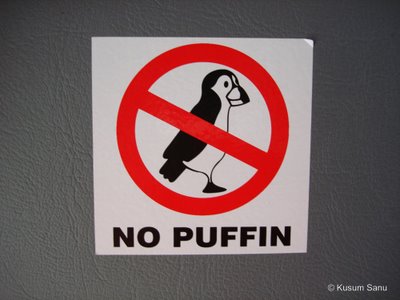 December 27, 2009 - The South Korean government has given the ‘green light’ to transform the remote Jeung Island in South Jeolla province as a smoke-free, car-free and night lights-free village.
December 27, 2009 - The South Korean government has given the ‘green light’ to transform the remote Jeung Island in South Jeolla province as a smoke-free, car-free and night lights-free village.
The 28.16 square-kilometer (10.87 square-mile) island with 857 households is already a popular tourist destination. This year alone, 250,000 tourists visited the island, which has the largest salt pan in the nation.
Aiming to provide its people with a nostalgic rest while protecting its natural environment, Jeung Island of Sinan County, South Jeolla province, is challenging itself to become the “Slow City” where there is no pollution. The island was designated in December 2007 by the International Slow Food Movement as a slow city.
In order to transform itself further to meet the definition of a slow city, the island has been campaigning to prohibit smoking. In order to transform itself further to meet the definition of a slow city, the island has been campaigning to prohibit smoking. There were only about 150 smokers on the island. However, 35 of them had already quit with the help from the public health care staff who have been running clinics in 11 villages.
Determined to drop its smoking rate from the 8.6 percent measured last July to zero by next spring, the county government also plans to request tourists to douse their cigarettes. To do so, the county already removed three stores selling cigarettes and is currently trying to persuade the other four to leave. The county’s local legislative council recently passed a bill restricting cigarette sales and designating the island as the “clean air zone.”
Aware of the growing demand for more environment-friendly policies, Jeung Island has also banned chemical detergents.
Reference: Island barring smoking, cars, lights, JoongAngDaily. 12/28/2009.
South Korea - some related news briefs:
South Korea - Stressed-out Koreans smoking more..;
South Korea - to ban smoking in public places from 2011..;
Korea - BAT - winning the hearts and minds of customers based on tactics tailored to local tastes..;
Korea - sets target to reduce smoking 10% in 5-years..;
Korea - stricter regulation of the tobacco industry coming..;
South Korea - tobacco imports surge 396-fold over 10-years..;
Korea - slight increase in men smoking.. ;
South Korea - anti-tobacco campaign - body painting..;
Korea - smoking ban just about everywhere by end of 2009..;
Tobacco marketing in South Korea has been deliberately aimed at girls and young women..;
Korea - smoking rates fall for men and women...
remote island
Read more...
France - some smokers are flaunting the ban on smoking..
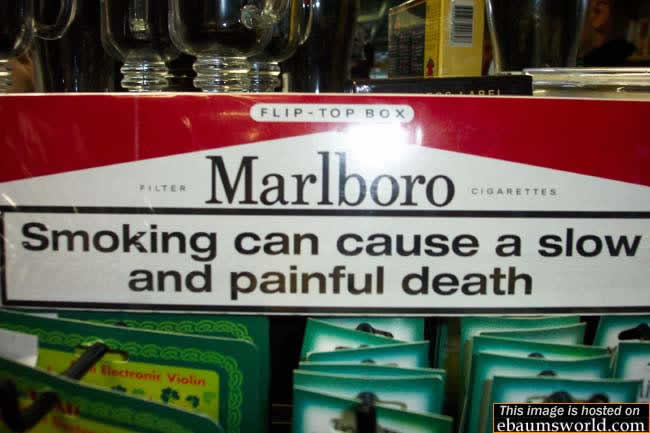
The Non-Smokers' Rights (NSR) association says it has collected data and evidence showing that the ban on smoking in the workplace is currently being violated far more than it was when the law came into effect in 2007. Studies show that complaints by people of exposure to second-hand smoke at work, which dropped from nearly 43% in 2006 to just 9% the following year, has now gone back up to 21%, according to NSR. The reason? Widespread government enforcement of the law never materialized as expected, leaving employers and workers less worried about being fined nearly $200 per infraction. Some employees now light up at their desks or by the coffee machine instead of joining their shivering colleagues outside, and many bosses turn a blind eye to it.
"The clear lack of inspection or punishment has inspired a small minority of smokers to ignore the ban — a lead that a growing number of their co-workers are deciding to follow," says Rémi Parola, a NSR official. "The law was effective in getting people to accept non-smoking as the legal and social norm, and that's now being slowly eroded."
And it's not just happening at work. NSR says non-enforcement is giving defiant smokers the courage to light up in other public areas. Some smokers now routinely puff away in bars or cafés and self-policing owners and managers are often hesitant to tell them to stop out of fear they'll anger paying clients. Worse still, NSR says, are the enclosed terraces proliferating outside cafes and restaurants across France. The temporary glass or plastic structures were initially set up to keep customers warm so they can enjoy an "outside" café experience in chilly weather. But when smokers were forced outside, these terraces became de facto smoking zones that other patrons now have to cross to get indoors. NSR contends that the smoke also drifts inside — it says it has conducted tests showing that the air in establishments with covered smoking terraces is three times as toxic as in restaurants and cafés without them. (See the top green ideas of the year.)
If smokers become bolder about lighting up indoors, however, non-smokers may begin demanding greater action from authorities. Even Parola acknowledges that second-hand smoke levels have vastly improved since the ban went into effect, saying his group's current campaign is only aimed at improving enforcement enough to prevent a gradual return to 2006 habits.
Even though there are costs associated with enforcement, the government will probably still come out ahead —officials estimate that the state spends about $15 billion a year treating smoking-related illnesses. Stamping out a few butts could amount to very little in comparison.
From the TIME photo gallery - old tobacco ads..
A few related news briefs;
Cigarette sales in France dropped to a record low in 2008..;
French researchers announced a striking 15% decrease in admissions of patients with myocardial infarction to emergency wards since the public ban on smoking came into effect..;
France - cheaper cigarettes close by in Belgium...
Reference: Smoking Ban? The French Light Up Again in Public by Bruce Crumley - Paris, TIME, 12/26/2009.
Read more...
North Carolina (NC) - beginning in January 2010 fire safe cigarettes ( FSC), smoking ban in public places..
 December 27, 2009 - New state laws taking effect in the beginning of January will make cigarettes more fire safe, but will also prohibit smoking in public places or places of employment.
December 27, 2009 - New state laws taking effect in the beginning of January will make cigarettes more fire safe, but will also prohibit smoking in public places or places of employment.
On Aug. 24, 2007 the NC general assembly signed the Fire Safety Standard and Firefighter Protection Act into law. This legislation would require cigarette manufacturers to produce and sell cigarettes which would go out after a few short moments if not drawn on. New York was the first state to pass such laws in 2004.
A ban on public smoking in the state will also go into effect on Jan. 2, 2010. The statewide ban was signed into law by Gov. Bev Perdue on May 19 of last year. The law according to the bill will make smoking “prohibited in all enclosed areas of restaurants and bars.”
The public smoking ban will exclude a number of specific businesses and will not apply to: research facilities studying tobacco, designated smoking rooms in lodging establishments, private residences or vehicles, cigar bars, private clubs, tobacco product manufacturing premises and actors using tobacco in a live production set.
FSC cigarette details: According to General Statute 58925, the general assembly reported cigarettes to be “the leading cause of fire deaths in this state and the nation.” This finding along with others corresponds with a study conducted by the National Fire Protection Association (NFPA). The study, titled “U.S Smoking-Material Fire Problems,” found that between the years of 2003 and 2006, 40 percent of fatal home smoking material fire victims were sleeping when they were injured; 34 percent of material fire victims were attempting to escape, to fight the fire or to rescue others. The report also states that in the year 2005, an estimated 800 civilian deaths resulted from cigarette related fires. FSC laws have become effective in all other states except Wyoming. - For more information see reference..
Public Smoking Ban Details: According to the bill North Carolina Session Law 2009-27, forbidding public smoking in public establishments, businesses will be required to post signs easily in view of the public “clearly stating that smoking is prohibited.” Indoor ashtrays must also be removed by businesses. Anyone who has been directed to put out their cigarette and still breaks the law will be fined no more than $50. - For more information see reference..
Reference: Change has come for smokers in NC New law promises to help the state ‘kick the habit’ in public places by Davin Eldridge Contributing Writer, The Macon County News, 12/23/2009.
Related North Carolina smoking ban news briefs:
North Carolina - smoking ban simple details, January 2, 2010..;
North Carolina - smoking ban does not allow hookah bars to operate - RIGHT..;
North Carolina smoking ban includes banning hookah bars..;
North Carolina Governor Purdue signs smoking ban law..;
North Carolina - legislators approve smoking ban..;
North Carolina - smoking ban scaled back again..;
North Carolina Senate Health Committee votes for stricter smoking ban..;
North Carolina House poised to pass smoking ban..;
North Carolina - ban on smoking in public places passes 1st test...
Read more...
Cayman Islands - public places will be smoke-free from 31 December 2009..
Health Minister - Mark Scotland.. December 27, 2009 - It may have been almost a decade in the making but at long last government is enforcing legislation which stops the use of tobacco in enclosed public areas and creates smoke free air in enclosed public areas. One of the key provisions of the Cayman Islands’ Tobacco Law, 2008 is that all public places will be smoke-free from 31 December 2009. Legislated smoke-free areas include enclosed bars, restaurants and pool halls, parks, any commercial transport, public toilets and public transportation terminals (e.g. the cruise terminals) and all shops and shopping centres.
A disappointment to anti-tobacco activists and health campaigners, however, the law does allow for designated smoking areas in open air bars and restaurants.
This designated areas are faced with certain restrictions and they must be clearly marked They must be at least 10ft away from the non-smoking areas and they cannot be in, or within 10ft of, any entrance, exit or any other openings of the enclosed section. The Law defines ‘enclosed’ as a place which has a full or partial roof and where the sides are at least 50% covered with walls, windows, blinds or curtains.
Despite the fact that the legislation has been in place for well over a year business owners are still being given time to comply with the Law. The Public Health Department, in conjunction with the Chamber of Commerce, Cancer Society and the Cayman Islands Tourism Association (CITA), has developed sample signs for tobacco dealers and restaurants and bars. Officials have also met with members from the business community to explain the new legislation and its impact on businesses.
“We are all working together to ensure compliance, and although we urge business owners to have the necessary provisions in place by the end of this year, we are also realistic. As such, we will give business owners until 30 April 2010 to have the necessary, permanent signs in place,” Medical Officer of Health Dr. Kiran Kumar said.
Similarly, tobacco dealers – retailers and wholesale distributors - have until 30 April 2010 to register with the Medical Officer of Health (Public Health Department). This will be an annual registration and dealers must display their Certificate of Registration (similar to a Trade and Business License). There is a once-off non-refundable application fee of $100, and the annual registration fees are as follows: CI$500 for a retailer; CI$750 for a cigar bar; and CI$5,000 for a wholesale distributor.
Those whose primary customers are minors (children under 18 years), for example indoor play areas; recreational facilities such as gyms, cinemas, parks (e.g. Botanic Park) or games rooms, and vendors inside health care, educational and cultural facilities (e.g. the Harquail Theatre) will not be able to apply for a tobacco registration.
For many people the legislation did not go far enough and ban smoking in other public places that are outside such as the beaches and parks. However, even in what is considered a diluted form the legislation is expected to save lives. Research in other jurisdictions has revealed that smoking bans can reduce deaths from heart related diseases by as much as 35%.
Application forms for the tobacco registry are available from the Public Health Department at the Cayman Islands Hospital in the New Year. For more information on the Tobacco Law and Regulations, business owners can contact the Public Health Department at 244-2621.
Reference: New Year tobacco ban to provide smoke free airCayman News Service, 12/23/2009.
Related Cayman Island news briefs:
Cayman Islands - start of smoking ban delayed until December 31, 2009..;
Cayman Islands - tobacco sellers given 10-month grace period..
Read more...
Denmark - more and more Danes supporting stricter anti-smoking laws..
 December 27, 2009 - A majority of Danes believe that the present laws restricting smoking should be expanded, according to a Gallup/Berlingske Tidende poll.
December 27, 2009 - A majority of Danes believe that the present laws restricting smoking should be expanded, according to a Gallup/Berlingske Tidende poll.
The laws were tightened just two and half years ago to include all indoor public places except the nation’s smallest pubs and private offices. But 53 percent of those polled indicated they now want the law to include all public sites without exception.
Danish smoking ban day: August 15th, 2007..
Sociologist and lifestyle expert Emilia Van Hauen: It’s considered un-hip and lower class nowadays. People who are addicted to smoking are now viewed much like the obese – they lack self-discipline."
A planned revision of the current law that was to take place early next year has been postponed until 2011, the issue to be first discussed in parliament. According to the Danish Cancer Society, between 200 and 400 people die each year from conditions related to passive smoke inhalation.
According to the Danish Cancer Society, between 200 and 400 people die each year from conditions related to passive smoke inhalation.
The national government owes it to the rest of the country to promote growth in Greater C... Copenhagen Podcast
Reference: Smoking laws not strict enough , the COPENHAGEN Post online, 12/21/2009.
Denmark Coat-of-Arms
Read more...
Bangladesh - GATS - tobacco use among adults reaches 43.3 percent..
 December 25, 2009 - The report, titled "The Global Adult Tobacco Survey (GATS) Bangladesh Report-2009" showed a total of 41.3 million people in the South Asian country are now in the habit of using tobacco -- either in the form of smoking or chewing.
December 25, 2009 - The report, titled "The Global Adult Tobacco Survey (GATS) Bangladesh Report-2009" showed a total of 41.3 million people in the South Asian country are now in the habit of using tobacco -- either in the form of smoking or chewing.
Official Complete Survey Results - GATS: Fact Sheet: Bangladesh: 2009.."
According to the study, which was conducted on 11,200 households by the World Health Organization (WHO) in association with the Bangladeshi government, 58 percent of the respondents are male and 28.7 percent are female. The prevalence of tobacco use in rural areas is 45.1 percent and 38.1 percent in urban area, it said.
The report also revealed an estimated 1 percent of the national income in terms of gross domestic product (GDP) is spent on purchase of cigarettes and 0.4 percent on bidis (a kind of locally manufactured tobacco).
"Overall economic loss due to tobacco use is very high in fact, "Bangladeshi Health Minister AFM Ruhal Haque was quoted as saying at the launching ceremony of the report on Tuesday.
Use of tobacco is directly linked to health and it is responsible for different non-communicable diseases, he said, adding that the previous report of the WHO in 2004 revealed that around 57,000 people died every year in the country due to the diseases related to tobacco.
The minister said the government is considering making it mandatory to print pictorial health warnings on the packets of cigarettes.
The government recently includes the messages of harmful affects of tobacco in school textbook curriculum to raise awareness of the society.
According to the report, imposing additional taxes on tobacco production, amendment to the Tobacco Control Act and its implementation, anti-smoking media messages and pictorial health warnings on all tobacco products were recommended following the study.
References: Tobacco use on rise despite law Goes up to 43pc from 37pc in 2004, says WHO study, Staff Correspondent, The Daily Star, 12/23/2009; Tobacco use among adults in Bangladesh reaches 43.3 pct, Source: iStockAnalyst, 12/23/2009.
Related news brief:
Bangladesh - FCTC overtaxation hurts tobacco industry country depends on..;
Bangladeshi government will increase taxes on tobacco products..;
Marlboro to be Marketed in Bangladesh - One of the Poorest and Densely Populated Countries in the World..
Read more...
PMI - proposed Japanese tobacco tax increase..

December 25, 2009 - NEW YORK (TheStreet) -- Philip Morris International(PMI) shouldn't be too negatively affected by Japan's proposal to raise taxes on tobaccco [tobacco], according to Stifel Nicolaus.
Directly related news brief: Japan Tobacco - reacts angrily to governments decision to raise cigarette tax..
The proposed legislation includes a tax increase of 70 yen (76 cents) per pack and is accompanied by a 5 yen per cigarette or 100 yen per pack increase in the market, writes Stifel Nicolaus in a note.
If the legislation goes through and the full price of 100 yen per pack of cigarettes is enacted, prices of PMI's Marlboro cigarettes could rise by about 30% to 430 yen from the current price of 330 yen in Japan.
At first glance, all this would seem worrying to PMI, especially given the rigorous channels that tobacco companies have to go through in order to raise prices in Japan and compensate for any demand shortfall.
"Japan has been missing one key element found in nearly every other major market around the world -- pricing," the analysts wrote. "The robust decline in this market due to the aging population and lower incidence of smoking has not been met with the usual profitable scenario we find in other markets (France, Germany, U.K., etc.), where pricing goes up to more than make up for the decline in volume."
"Japan is a bit stickier in this instance because the Ministry of Finance has to approve price increases."
Reference: Philip Morris Faces Japan Tax on Tobacc by Andrea Tse, The Street.com, 12/23/2009.
Read more...
Reynolds American - executive interview, Thomas Adams, Vice President And CFO..

December 25, 2009 - Executive Interview: Reynolds American, Inc. - Thomas Adams, Vice President And CFO
Wall Street Transcript has just published Food, Beverages and Tobacco Report. One of those reporting was Thomas Adams, Vice President and CFO, Reynolds American, Inc. Read more...
Serbia - government abandons plans to introduce a blanket ban on smoking indoors..
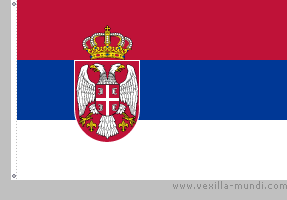
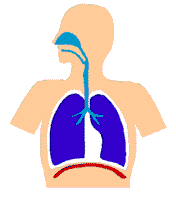
December 25, 2009 - Danas (daily newspaper published in Serbia) says that this decision came after government officials held a meeting with cigarette manufacturers in Serbia.
Tobacco contributes significantly to the burden of disease in Serbia, and it has one of the highest age standardized lung cancer incidence rates in Europe.
The government has agreed to the “protection instead of ban” principle, promoted by cigarette makers and restaurants, the newspaper learned from a source close to the Cevtković cabinet. According to this report, the meeting was held between Ministers of Health and Economy Tomica Milosavljević and Mlađan Dinkić and representatives of cigarette manufacturers last week.
More details from the meeting have not been made public since the participants agreed to keep silent, "but the solution will be presented in several days". When asked to comment on the news, a surprised Milosavljević told the newspaper's reporters, “Why are you asking me about this now? The law is in procedure and I have nothing to add."
The tobacco industry representatives have not been more forthcoming either. The newspaper says they have been pressuring journalists during the past few months and offered to make statements condemning the preparation of the law, but chose to remain silent now.
One of the dilemmas, the article says, is whether the government chose this move as compensation for a violation of the so-called gentlemen's agreements made with tobacco companies when the domestic factories were privatized.
The new owners were promised "protection" until the factories they bought were “back on their feet”.
The tobacco companies have, however, lost that "protection" due to obligations which Serbia assumed as it joined CEFTA, the regional free trade agreement. There has been public speculation that some of the international companies considered leaving Serbia because of this.
Now, the newspaper says, "it is assumed that a blanked ban on smoking ban would perhaps represent one measure too many".
The draft law to regulate smoking in public places was finished in October 2009, but has not been adopted by the government yet. It entered the procedure about a month ago, but was then suddenly withdrawn.
Reference: "Govt. gives up on blanket smoking ban", Source: Danas, 12/24/2009.
Related news brief: PMI - lays off more than 300 workers in Serbia..
Read more...
Macedonia - ban on smoking in public places takes effect on January 1, 2010..

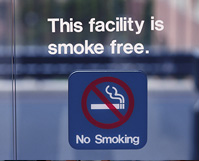 December 25, 2009 - A ban on smoking in public places takes effect in Macedonia at the stroke of New Year, but some members of parliament (MPs) and the hospitality industry are fighting a last-ditch battle.
December 25, 2009 - A ban on smoking in public places takes effect in Macedonia at the stroke of New Year, but some members of parliament (MPs) and the hospitality industry are fighting a last-ditch battle.
Like most European Union and candidate EU states, Macedonia has announced restrictions on smoking, but those who oppose the ban are citing precedents in other countries that have eased such bans.
In September 2009, Croatia eased restrictions, while subsequently Greece and Serbia reportedly were considering doing the same. In some countries, notably Bulgaria, the existing restrictions on smoking in public places are widely ignored – though, ironically, the Government in Sofia has announced that the ban will be widened in 2010.
Previous news brief: (November 11, 2009 - Macedonia has become the latest country in South Eastern Europe to announce a ban on smoking in restaurants and bars, and the latest to hear vociferous complaints from restaurant owners that their businesses will be ruined.>
Macedonia Radio and Television said on December 25 2009 that state inspectors had been dispatched to tell the owners of cafés and eateries that the smoking ban must be complied with in the first minutes of 2010, shortly after people finish wishing each other a happy new year. "State Inspectorate crews will be working overtime during the New Year's holidays, including the New Year's Night, Saso Jakimovski, the head of the state market inspectorate, was quoted as saying. The fine for places found in breach of the smoking ban is set at 2500 euro (3,595.25 USD) to 4000 euro (5,752.40 USD), while individuals will be fined 150 euro (215.72 USD) to 300 euro (431.43 USD).
However, Macedonia’s Dnevnik newspaper said that a group of MPs, led by Georgi Oroshavets and former prime minister Vlado Bucovski, was preparing an attempt to trim back the anti-smoking regulations before the end of January. According to a report by Bulgarian news agency Focus, quoting Dnevnik, Bucovski said that Macedonians could not become "bigger Catholics that the Pope" and there was no need for Macedonia to have such a restrictive law, when – he said – there was a trend throughout Europe towards "loosening" the ban.
Retreats from smoking bans were being ordered because of the bans’ impacts on hotels and the restaurants, Buckovski said. Media in Skopje reported Donco Tanevski, the Chairman of Hotel Association of Macedonia, as saying that the smoking ban will additionally hit tourism workers.
From Belgrade, Danas reported on December 24 2009 that the Serbian government had "abandoned" plans for a blanket ban on smoking indoors. The daily said that this had followed a meeting between government officials and cigarette manufacturers in Serbia.
The government has agreed to the "protection instead of ban" principle, promoted by cigarette makers and restaurants, Danas quoted a source close to the Cevtković cabinet as saying.
In Greece in November, health minister Mariliza Xenogiannakopoulou said that there were "great gaps in the application of the smoking ban" because many establishments were simply not complying. Athens-based daily Kathimerini reported that at the time that Greek officials said that they would launch a review of the law, which was approved earlier in 2009 following complaints from non-smokers at home and pressure from the European Union.
References: Smoking controversies in Macedonia, Serbiaby Clive Leviev-Sawyer, the Sofia Echo, 12/25/2009; Smoking ban effective on New Year's Eve, Macedonian Radio and Televsion, 12/25/2009.
Read more...
Singapore - e-cigarettes are illegal..


December 24, 2009 - In Singapore the import and sale of e-cigarettes is illegal because under anti-smoking laws, anything that resembles a tobacco product cannot be imported, sold, or offered for sale. If convicted, a person can be fined up to 5,000 Singapore dollars (3,496 U.S. dollars). Health Sciences Authority (HSA): there is no smoke and no fire but an e-cigarette is still a cigarette.
So far this year HSA has evicted 13 people for bringing in and selling the much-hyped e-cigarette, local media reported on Wednesday, December 23. Among the 13 individuals investigated are four local suppliers who set up websites to hawk the product. The other nine ordered the device online from overseas suppliers, local newspaper. Last year's numbers are unavailable as cases started appearing late last year.
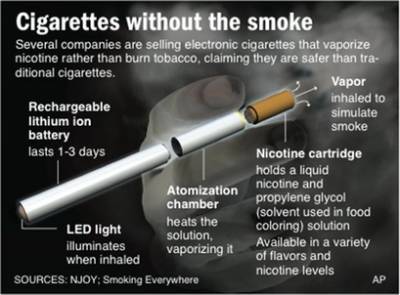 Touted as a "healthy" way to beat rising cigarette prices and a widening ban on smoking here, the electronic cigarette comprises a cartridge of liquid nicotine inserted into a battery-operated steel tube. A heating coil vaporizes the nicotine into a fine mist, which is then inhaled.
Touted as a "healthy" way to beat rising cigarette prices and a widening ban on smoking here, the electronic cigarette comprises a cartridge of liquid nicotine inserted into a battery-operated steel tube. A heating coil vaporizes the nicotine into a fine mist, which is then inhaled.With e-cigarettes there are many flavored cartridges to choose from such as cherry and strawberry. Do you want your child to be a nicotine addict for the rest of their lives??
References: 13 people warned or fined over e-cigarettes in Singapore, Editor: Lin Zhi , ChinaView.cn, 12/23/2009; 13 warned, fined over e-cigs by Teh Joo Lin, The Straits Times, 12/23/2009.
Singapore - some related news briefs: Singapore - record number of smuggling attemps for 1st part of 2009..;
Singapore - new measures to discourage smoking among the young..;
Singapore - more people were smoking in 2007 than 2004..;
Singapore - Smoking increase despite public ban, price hike..; Singapore - Introduction of Tobacco Stamp to combat contraband...
Read more...
Star Scientifiic denied new trial in patent infringement - files appeal..

December 23, 2009 - A federal judge in Maryland has denied Star Scientific Inc.'s request for a new trial after the company lost a patent infringement case against R.J. Reynolds Tobacco Co.
Star has now filed a notice of appeal, which was filed in the US District Court for Maryland, states that Star is appealing to the US Court of Appeals for the Federal Circuit the judgment, orders and decisions specified in the notice, including the judgment resulting from the June, 2009 jury verdict in favor of RJR. (Notice of Appeal Filed by Star Scientific in Patent Infringement Lawsuit, RedOrbit, 12/23/2009.)Star filed the lawsuit in 2001 against Winston-Salem, N.C.-based Reynolds, the nation's second largest tobacco company. The lawsuit claimed that Reynolds had infringed Star's patents for a process designed to reduce some cancer-causing constituents in cured tobacco leaf. Reynolds countered that Star's patents should not have been granted. (Star Scientific Inc. Files Suit Against R.J. Reynolds to Enforce Patent for Curing Tobacco to Substantially Prevent the Formation of Cancer-causing Tobacco Specific Nitrosamines - TSNAs, FindArticles.com - Business Services Industry, 5/24/2001)
The U.S. Patent and Trademark office also is re-examining the patents at Reynolds' request. Pending the outcome of the patent review and the appeal, U.S. District Court Judge Marvin J. Garbis stayed a decision on whether Star should pay attorneys fees and other costs that Reynolds incurred as a result of the lawsuit.
In March 2009, the Supreme Court refused to hear the case, clearing the way for the trial that led to Tuesday's verdict in U.S. District Court in the Northern Division of Maryland.
A federal jury ruled on June 2009 that RJ Reynolds Tobacco Co. did not infringe on two patents claimed by Star Scientific for a tobacco-curing method. Star Scientific shares lost nearly 80 percent of their value in late trading. (UPDATE 3-Star Scientific loses Reynolds U.S. patent dispute, Reuters, 6/16/2009)
Reference: Judges denies new trial for Star Scientific, Staff Reports, Richmond Times-Dispatch, 12/23/2009.
Some related Star Scientific news briefs:
Star Scientific - NASDAQ trading symbol changed to CIGX..;
Star Scientific - new product (in 2010) to help adult smokers maintain a nicotine-free metabolism..;
Star Scientific - will use its low-nitrosamine tobacco curing process to formulate smokeless tobacco dissolvable smokeless products..
Star Scientific - q2 2009 report..;
Star Scientific - Filing patent for zero-nitrosamine tobacco curing process..;
Star Scientific - 2008 annual report/Stonewall vs other OTC NRTs..;
Star Scientific Corporate Study Stonewall Lozenge in NRT..;
Star Scientific Files Third Quarter Financial Report..;
Star Scientific wants to augment sales of their tobacco lozenges..;
Star Scientific , second quarter 2008, sales down 23.6%..;
Star Scientific Applauds Recent State Legislation - Banning Smoking in Cars with Children..
Read more...
India - government set to ban foreign direct investment in tobacco..
 December 23, 2009 - The government is all set to accept the recommendations of a ministerial group and ban foreign direct investment (FDI) in tobacco, dealing a blow to the plans of international tobacco firms that have long eyed a bigger presence in the Indian market, e.g., Japan Tobacco International’s (JTIL) proposal to raise stake in its Indian venture to 74% from 50% now.
December 23, 2009 - The government is all set to accept the recommendations of a ministerial group and ban foreign direct investment (FDI) in tobacco, dealing a blow to the plans of international tobacco firms that have long eyed a bigger presence in the Indian market, e.g., Japan Tobacco International’s (JTIL) proposal to raise stake in its Indian venture to 74% from 50% now.
A decision to ban FDI will draw a line under a long-running issue that has seen hectic lobbying from domestic and foreign players, and will be victory for the health ministry, which had sought a total FDI ban in tobacco. While the government does not allow creation of fresh cigarette manufacture capacity, the current policy lacked clarity on whether FDI is allowed in this sector. The policy had come under attack from various quarters, especially the health ministry.
JTIL, the third-largest manufacturer of cigarettes in the world and the owner of brands such as Camel, Winston, Gold Coast and Salem, had sought the Foreign Investment Promotion Board’s (FIPB) permission to raise its stake in its Indian unit — JTI India — in July and October last year and again in January this year. The company had argued that its proposal was to buy out the shares of the Thakkar family, its Indian partner, and not invest in fresh capacity. When the proposal came up for consideration in January this year, the DIPP deferred a decision on the company’s application, saying it needed more time to finalise the FDI policy for the tobacco sector. In June 2007 JTI Launched WINSTON cigarettes in India.
Foreign tobacco giants have long lobbied for greater FDI in the sector, although local tobacco firms have opposed it.
The move by JTI India comes against the background of strong objections by domestic tobacco companies that forced the government to reject proposals by international tobacco majors like Philip Morris, Rothmans and British American Tobacco (BAT) to set up subsidiaries to sell their tobacco brands. Philip Morris' tobacco proposal was rejected in 1997 but it was given permission to set up a 100 per cent subsidiary to sell food and beverage.
The controversy began in the mid-nineties, when the Indian management of ITC, the country's largest tobacco company, opposed all moves by its UK shareholder BAT, which owns about a third of ITC's shares, to initially increase its stake in the Indian company. It also refused BAT a no-objection certificate to set up a 100 per cent subsidiary.
When the proposal came up for consideration in January this year, the DIPP deferred a decision on the company’s application, saying it needed more time to finalise the FDI policy for the tobacco sector. However, the proposal was bitterly opposed by the health ministry, which argued that it would encourage the growth of the tobacco industry. The CCEA had then directed the inter-ministerial group to take a final call on the issue.
Philip Morris International chairman and CEO Louis C Camilleri has in the past written to former commerce minister Kamal Nath arguing that protectionism was an ineffective tool to address public health objectives and would only entrench existing players.
Dominique Dreyer, Swiss ambassador to India, also wrote to the DIPP a few months ago pressing for an increase in investment by a Swiss affiliate of the US-based Philip Morris in India’s Godfrey Philips. The world’s largest tobacco company has been trying to acquire its partner KK Modi’s stake in Godfrey Philip for some time now.
50 Years of Cancer Control - Tobacco Control in India.. by Kishore Chaudhry - not curent.
Reference: Govt may stub out FDI in tobacco, Rohini Singh, Eeconomic Times, 12/22/2009.
India - some related news briefs:
*India - despite tobacco control measure in place - tobacco sales increase..;
*India - still confusion pictorial warnings on cigarette packs..;
*Mumbai, India - NGO activists want closure of hookah bars..;
*India - gutkha and bidi companies NOT pictorial warnings..;
*India - cigarette packs with pictorial warnings are here..; *ndia - NO graphic pictorial warnings yet..;
*India - Still no pictorial warnings on cigarette packs..;
*India - pictorial warning on cigarettes and tobacco products effective May 31, 2009..;
*India - pictorial warning on cigarettes and tobacco products will be implemented from May 31 - no doubts about it..;
*India - will pictorial or graphic health warnings be implemented from May 30, 2009..;
*India - placing pictorial warnings on tobacco products delayed again..
Read more...


To Provide Public Awareness
Purpose
About Us
Contact Us
2008 HIGHLIGHTS
TOPIX PAPERS - 2008 & 2009..
Archive
-
▼
2009 (1446)
-
▼
12/27 - 01/03 (21)
- Malaysia - new tobacco tax should be positive for ...
- Malaysia - youth and student smokers may not recei...
- Kansas - cigarette tax hike likely in 2010..
- Bulgaria - price of cigarettes increases..
- Cyprus - starting January 1, 2010 blanket ban on s...
- U.S. Eleven states starting January 1, 2010 will r...
- Bulgaria - Bulgartabac stays in the economy minist...
- Altria expecting Copenhagen Wintergreen to have b...
- Tokyo, Japan - smokers find haven on smoke-free s...
- Bangladesh - nearly 70 percent of current smokers...
- Vietnam - who will enforce smoking ban to start Ja...
- Hawaii - tobacco tax increases help curtail local ...
- Exposure to Tobacco Smoke in Childhood Home Associ...
- United States - poverty, smoking, and high-school...
- Malaysia - two tobacco control regulations startin...
- Victoria, Australia - make cigarettes $20 a pack,...
- South Korea - remote island going smoke-free, car...
- France - some smokers are flaunting the ban on sm...
- North Carolina (NC) - beginning in January 2010 f...
- Cayman Islands - public places will be smoke-free ...
- Denmark - more and more Danes supporting stricter ...
-
►
12/20 - 12/27 (24)
- Bangladesh - GATS - tobacco use among adults reac...
- PMI - proposed Japanese tobacco tax increase..
- Reynolds American - executive interview, Thomas Ad...
- Serbia - government abandons plans to introduce ...
- Macedonia - ban on smoking in public places takes ...
- Singapore - e-cigarettes are illegal..
- Star Scientifiic denied new trial in patent infrin...
- India - government set to ban foreign direct inves...
-
▼
12/27 - 01/03 (21)